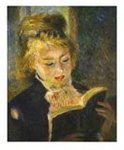 The Memory Keeper's Daughter
The Memory Keeper's Daughterby
Kim Edwards
2005, 401 pp.
Rating: 4.5
I was impressed by this book, and especially so as it was the author's debut.
The following paragraph isn't really a "spoiler" as it happens in the first few pages of the book.
Dr. David Henry and his wife Norah can't get to the hospital in time to have their baby, so they go to his own doctor's office. The birth goes fine and a healthy baby boy named Paul is born. However, they unexpectedly have twins (it's 1964), and there is a "problem" with their daughter--she has Down's Syndrome. Due to his own family background of having a chronically ill sister, David tells the nurse Caroline to take it to a "home". Meanwhile, he tells his wife that their daughter Pheobe has died. The rest of the book goes into their marriage and family relationships in the aftermath of this "secret".
I loved the story for several reasons. First, it was very well written and was a very easy read. I read the book in a 24 hour period. Also, it is mostly set in Lexington, Ky, and I live only an hour from there. Many of the descriptions of the bluegrass area were things I recognized and appreciated. I related to almost all the main characters for personal reasons. In fact, this book was one I chose to offer about myself for the Something About Me Challenge. David feels like an "imposter" in his professional life, Norah has postpartem depression, and Paul is kept from the knowledge that his sister is alive. These were all issues that I have experienced as well.
The book is a little sad and explores the consequences of family secrets, but it is also hopeful. I look forward to Kim Edwards' next novel.








